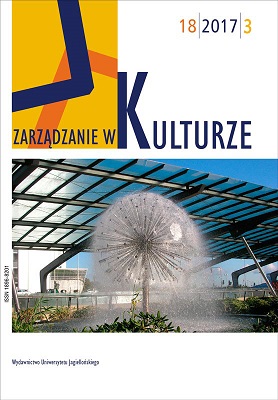Zarządzanie Kulturą A Hegemonia Dyskursu Ekonomicznego – Analiza Przypadku: Teatr Studio W Warszawie
Culture Management and a Hegemony of Economic Discourse – Case Study: Studio Theatre in Warsaw
Author(s): Joanna KaszaSubject(s): Theatre, Dance, Performing Arts, Business Economy / Management, Governance, Culture and social structure , Sociology of Culture, Sociology of Art
Published by: Wydawnictwo Uniwersytetu Jagiellońskiego
Keywords: management; cultural political economy; conflict in Studio Theatre in Warsaw;
Summary/Abstract: Usually when we talk about culture management, whether in the context of the object (reflection on what we manage in the sphere of culture: the definition of culture or/and culture goods), as well as in the context of the subject (reflection on the actors involved in this process, i.e. artists, intermediating institutions and receivers), we should be prepare for a certain ambivalence of contrasting discourses or narrations, both within theoretical scientific discourses (discrepancies between the humanities and economic) as well as pragmatic approach resulting from the individual experience of management in culture. Presented case study of the conflict in Studio Theatre in Warsaw is the perfect example, that illustrates in practice this collision (short circuit in refers to S. Žižek’ favourite metaphor) of completely different paradigms, narration, or discourses, as well as individual values, expectations and experiences, which regardless of the attempts of exit from the impasse or negotiations on both side, is still escalating and rising in power. Evoked conflict, referring both to ideological issues (different values), as well as political (different interests), is at the same time personal conflict as well as substantive one: collision between artistic vision or management strategy for the artistic theatre (repertory’s theatre) and economic vision or management strategy of project theatre (event’s theatre). In refers to difference in epistemological and axiological assumptions, creation of a common space (conceptual, analytical and research) is of the particular importance, this requires a multidisciplinary approach/discourse (scientific, public, environmental), which takes into account relationships of both sides/disciplines/ environments, while assuming both: the critical approach or competition as well as common space and cooperation, underlying their mutual diffusion within the contemporary world of „liquid modernity”.
Journal: Zarządzanie w kulturze
- Issue Year: 18/2017
- Issue No: 3
- Page Range: 443-466
- Page Count: 24
- Language: Polish

